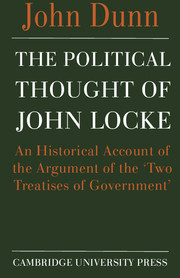 The Political Thought of John Locke
The Political Thought of John Locke 16 - The Coherence of a Mind 2
Published online by Cambridge University Press: 05 April 2012
Summary
Macpherson's analysis of Locke's discussion of property sees its key intention as the removal of the sufficiency limitation on private accumulation and the consequent sanctioning of unlimited appropriation. At the individual level the effect of this is to make property a pure private right, excised from the context of social responsibility implied by the medieval understanding of the duty of charity. It reduces rationality to appropriation and sets out as the apt project for each individual life an endless traverse of accumulation directed not to consumption, ease, or happiness but to its own relentless perpetuation. The poor are consigned to a convenient ignorance, made palatable by their compulsive credulity in the Christian faith, and the ends of the rich are embellished by their proclaimed superior rationality. In the internal politics of the country the propertyless are expelled from the political community and turned into a vast labour gang under the discipline of the rich and bereft of any protection against the most brutal exploitation except for the obligation of the replete not to permit human beings actually to starve to death. In foreign politics, its effect is to consign the political community to a career of self-conscious and unceasing territorial expansion and population growth in the classic mercantilist tradition, in the effort to protect national security, as Cox urges, and to maximize accumulation, as Macpherson himself prefers to emphasize.
- Type
- Chapter
- Information
- The Political Thought of John LockeAn Historical Account of the Argument of the 'Two Treatises of Government', pp. 214 - 228Publisher: Cambridge University PressPrint publication year: 1969


